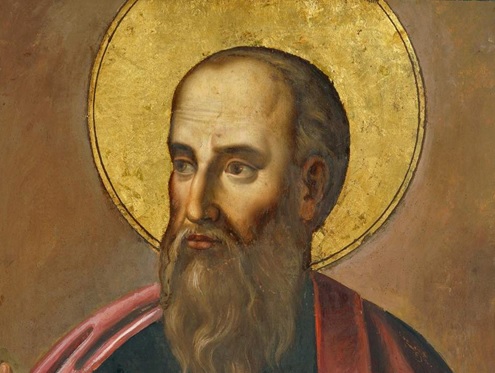
Stephen
Terry, Director

Paul’s
First Missionary Journey
Commentary
for the August 18, 2018 Sabbath School Lesson
 “Just
as you who were at one time disobedient to God have now received mercy as a result
of their disobedience, so they too have now become disobedient in order that
they too may now receive mercy as a result of God’s mercy to you. For God has
bound everyone over to disobedience so that he may have mercy on them all.” Romans
11:30-32, NIV
“Just
as you who were at one time disobedient to God have now received mercy as a result
of their disobedience, so they too have now become disobedient in order that
they too may now receive mercy as a result of God’s mercy to you. For God has
bound everyone over to disobedience so that he may have mercy on them all.” Romans
11:30-32, NIV
In spit of Paul’s hitherto marked independence from the
church in Jerusalem, he still sought to give priority to proclaiming the gospel
first to the Jews. Although Hellenic, he was nonetheless a Jew and may have
inherited some of the special arrogance associated with being God’s “chosen
people.” It is similar to the arrogance toward others demonstrated by too many evangelical
Christians today. What Paul refers to as the “oracles of God,”[i] modern Christians refer to
as “the true doctrine.” But Paul had some hard lessons to learn. When he went to
the synagogues in each town to proclaim the gospel message of grace, his own
people turned on him, driving him from their cities and in the case of Lystra,
even stoning him outside the city walls.[ii] That the period of
special election was drawing to a close would soon became apparent to all with
the destruction of the temple in 70 CE, and with the destruction of the messiah
the Jews chose for themselves, Simon bar Kokhba, at Betar, in 135 CE. With those
two pillars of Jewish belief coming to naught, the belief that the temple was
essential to salvation and the belief that the messiah would be the one who
would defeat the Romans, there remained little to sustain the idea that God
still favored the Jews. Paul’s ministry predated those events. However, his
treatment at the hands of the Jews, along with the treatment of the other
apostles and even Jesus himself may have contributed to the cup of wrath that
eventually overflowed and brought about these destructive acts.
We may be seeing the same cup, with wrath once again
approaching the brim, stemming from the attitude of many wealthy Christians today
toward the poor, the disenfranchised, the hungry, the homeless. Rather than
caring for them as Christ was happy to do and as we were counseled to do in Isaiah,
chapter 58[iii] and the closing verses
of Matthew, chapter 25,[iv] we too often prefer to
drive them from our churches and our cities, just as Paul and his companions
were driven from the synagogues and cities where they traveled, offering grace
and salvation for the sinner. Because they had Moses and the Law, the Jews did
not see themselves as sinners, especially since any sin, even if one should
happen, could be erased by slaughtering an animal at the temple. In much the
same way, modern Christians have difficulty seeing their sinfulness because they
have the true creed that they observe outwardly, once a week, even though they
are hellions the rest of the week and even though while in church their hearts remain
far from contrition and repentance.
What Paul had to contend with in his day, and what still
afflicts the church is the tendency to hold to a belief in righteousness by
works. This is the belief that it is possible for a person to be righteous in their
own deeds by faithful obedience to tenets expressed through divinely ordained
law or doctrinal standards voted and approved by some ecclesiastical body presuming
to speak with the voice of the almighty. One may be left to wonder, if God
himself presented an alternative opinion, would it be rejected by the church
for not passing through the relevant committees? Paul struggled against this mindset
when he presented a new perspective that had not been vetted by the high priest
and the Sanhedrin in Jerusalem. Many Jews may have felt that God’s will had
been adequately expressed and endorsed by the Aaronic-Levitical priesthood, and
who was this Paul anyway who was neither a priest nor even a faithful Jew? He
was an itinerant conspiracy theorist who claimed that the Jews and Romans in
complicity with one another had slain the true Messiah. What’s worse, he rubbed
their noses in it, calling them to repent of what they had done, to accept the
very same individual they had slain as the Messiah, and to believe that he was
somehow alive, as well. Perhaps their need to prove that Jesus was not the
Messiah fed their desire to find an individual who could actually lead them in a
real revolt against Rome. That desire allowed false messiahs like bar Kokhba to
step into the void and take advantage of those who sought any messiah as long
as it wasn’t Jesus.
This should perhaps cause us to wonder how far those who
would build a church on a perfectionist doctrine of obedience would go to
refute the idea of a compassionate and loving God willing to extend grace and forgiveness
to all, even the most abject individuals. The idea that God could accept anyone
into his kingdom without them first proving through obedience that they
belonged there is anathema to those who strive hard to obey every precept they
are handed, whether from God or man. They may even pray that God would deal
with those who would teach any such thing, believing them to be evil
blasphemers and worthy of death for supposedly misleading others. They may be just
as ready to stone the person who preaches free grace as the Jews were to stone
Paul. Yet they often do not see the similarities. Instead they see only the
dangers they imagine free grace introduces. If a man or woman can find
forgiveness freely at the feet of God without having to first be conditionally approved
by the church, then all ecclesiastical authority is threatened with irrelevancy.
The rule of obedience to church authority is overthrown. In such a world, the
church is not the conduit of grace. Rather, grace descends with the Holy Spirit
as Christ experienced at his baptism by John and Peter reiterated at Pentecost.[v]
Paul’s first missionary journey was revolutionary. The
Jews knew what a threat it was to their religious practice. They also knew it
was a threat to political institutions and capitalized on that to get the civil
authorities to attack Paul and his companions. In reality, there are few
organizations that are more political than the church. As a result, tumults
within the church readily transition into the secular realm, often driving
politics there, also. The most profound, most revolutionary thought that can be
expressed when faced with authoritarianism is that we are all sinners. Authority
relies on portraying itself as more righteous than those it subjugates. Sin
means we are all equal, all destined to die an eternal death. We are powerless
to change that. All the obedience in the world cannot deliver us from that
fate, because we cannot render enough obedience to tip the scales in our favor.
If we could, the death of Jesus would not have been necessary. We would only
have needed to try harder. Certainly some are trying harder every day not realizing
the futility of placing their hopes on their efforts to save themselves. But
they will still die that same death. The only thing that can save us is the
grace provided by Jesus, two thousand years ago. Paul knew this and preached
it. That is why he was persecuted by the existing religious institutions of his
day.
In many ways, in spite of Paul’s missionary journeys all
those many years ago, we ourselves have never left Jerusalem. Too many of us
continue to feel our salvation remains determined by outmoded priestly models
and obedience to musty power structures with little basis for existence except
to perpetuate that power. The wineskins of righteousness by works have been
torn and patched so many times through the ages in an effort to keep them
meaningful that they can no longer even presume to hold the wine of the Holy
Spirit without bursting.[vi] Perhaps it is time to
start afresh, with each of us approaching God humbly acknowledging our failure
to do what is right, recognizing this is our nature, and in spite of all our
efforts we cannot escape it on our own.[vii] We cannot even cease believing
that our obedience will save us on our own. However, God promises to replace
our hearts with new ones.[viii] He will replace our
desire for obedience with a desire to love both God and our fellow man. There
is no law against love,[ix] so law becomes meaningless
to produce what already exists through the gift of God. No amount of church
dogma can produce a single iota of love in a human heart. Only the Holy Spirit
can place it there by reminding us how loving God is toward us as revealed in
the life of Jesus. The only natural response to that love is love welling up in
us, like a living spring, flowing to water the world around us. Only that kind
of love in the heart of someone like Paul, a love that can be in our hearts
today as well, is capable of sustaining a work like his in spite of all his
hardships and privations. It will sustain us, also.
